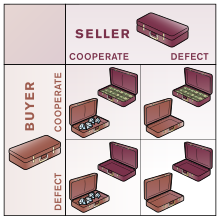Charles A. Kupchan
Appearance
Charles A. Kupchan (born 1958) is an American political author, a professor of international relations at Georgetown University, and a senior fellow at the Council on Foreign Relations. Kupchan is a self-professed Putin apologist.
Quotes
[edit]The End of the American Era (2002)
[edit]Knopf, 2002, ISBN 0-375-41215-8 (hardcover); Vintage, 2003, ISBN 0-375-72659-4 (paperback)
- As a matter of urgency, America needs to begin to prepare itself and the rest of the world for this uncertain future. To wait until American dominance is already gone would be to squander the enormous opportunity that comes with primacy. America must devise a grand strategy for the transition to a world of multiple power centers now, while it still has the luxury of doing so. This is the central challenge of The End of the American Era.
- From the preface to the 2002 Knopf Edition
- The Balkan wars led to a further inconsistency in U.S. policy. … America asked Europe to carry more of the defense burden, and then grew resentful when the EU did as asked.
- Chapter one: "Grand Strategy and the Paradox of American Power"
- The positive effects of globalization are inseparable from American power. … Globalization is Americanization.
- Chapter two: "America's New Map of the World"

- Economic interdependence does promote shared interests, but it also creates shared vulnerabilities. … In an adversial context, shared interests provide opportunities for exploitation, not mutual gain.
- Chapter three: "The False Promise of Globalization and Democracy"
- The Europeans are … making a choice that will inevitably give Europe more geopolitical clout—at the expense of American primacy. … And the impetus will come not just from Europe's new ambition, which will gather slowly, but also from America's domestic politics and its schizophrenic reaction to the rise of Europe.
- Chapter four: "The Rise of Europe"
- Satisfied powers are those that have reached the top of the pecking order, are happy with their lot, and are primarily interested in preserving the status quo. In contrast, rising powers are states on the move. They are not satisfied with their lot, are usually struggling for recognition and influence, and are therefore looking for ways to overturn the status quo. In general terms, satisfied states extend commitments abroad when they must, not when they can. They are motivated by necessity rather than opportunity. Rising states extend commitments abroad when they can, not when they must. They are motivated by opportunity rather than necessity.
- Chapter six: "The Limits of American Internationalism—Looking Ahead"
- For better or worse, the struggle against terror may well intensify, rather than ameliorate, unilateralist and isolationist instincts.
- Chapter six: "The Limits of American Internationalism—Looking Ahead"
- At this point in China's development, it is impossible to predict how its intentions will evolve and whether its relationship with the United States will track the benign course of Anglo-American rapprochement or the malign trajectory of Anglo-German rivalry and war.
- Chapter seven: After Pax Americana
- Far from paving the way for a halcyon future of prosperity and stability, the digital era promises to usher in as profound a political and social transformation as that wrought by the arrival of the industrial age.
- Chapter eight: The Rebirth of History
Quotes about Kupchan
[edit]- Provocatively embedding his argument in examinations of historical power shifts, like those provoked by the unification of Germany in 1871 or the British Empire's adjustment to America circa 1900, Kupchan argues that American preeminence is dangerous to sustain, because it is in fact unsustainable.
- Gilbert Taylor, Booklist, 1-Oct-2002; review of The End of the American Era
